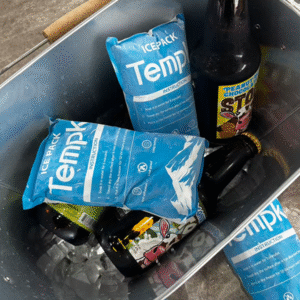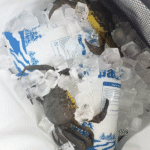How Do Packaging Supplies and Dry Ice Packs Enhance Cold Chain Logistics?
In 2025, the transportation of temperature-sensitive goods such as pharmaceuticals, vaccines, and perishable foods demands state-of-the-art cold chain solutions. Among these, packaging supplies and dry ice packs are critical components, ensuring goods maintain their required temperature throughout the supply chain. This article explores the role of dry ice and packaging materials in cold chain logistics, emphasizing their benefits, applications, and 2025 trends.
-
The essential role of dry ice packs in maintaining temperature control during transport
-
How packaging supplies ensure product integrity and prevent spoilage
-
Sustainability efforts in cold chain logistics with eco-friendly packaging and dry ice options
-
Best practices for choosing and handling dry ice in cold chain logistics
What Are Dry Ice Packs and How Do They Improve Cold Chain Logistics?
Dry ice packs are solid CO₂ that sublimate at temperatures as low as -78.5°C (-109.3°F). This unique property makes them ideal for maintaining ultra-low temperatures during the transport of pharmaceuticals, vaccines, biologics, and perishable foods. Dry ice provides a long-lasting cooling solution, often up to 72 hours, without creating excess moisture, unlike conventional ice.
Benefits of Dry Ice Packs in Cold Chain Logistics
-
Long-lasting cooling power: Dry ice packs provide consistent cooling for extended periods, maintaining critical temperature ranges.
-
No liquid residue: Unlike traditional ice, dry ice sublimates into gas, ensuring no leaks or contamination during transport.
-
Easy handling: With proper packaging, dry ice is safe and easy to manage, reducing handling risks.
The Versatility of Dry Ice Packs Across Industries
-
Pharmaceutical Logistics: Essential for shipping temperature-sensitive vaccines and clinical trial samples.
-
Frozen Food Logistics: Ideal for shipping seafood, meats, and frozen vegetables, ensuring they arrive in optimal condition.
-
Biotech Transport: Keeps biological samples at the required low temperatures during long-distance shipping.
| Application Type | Ideal Cooling Method | Duration | Key Benefit |
|---|---|---|---|
| Pharmaceuticals | Dry Ice Packs | 48-72 hrs | Consistent ultra-low temperature |
| Food Logistics | Dry Ice Packs | 48 hrs | Prevents spoilage and maintains quality |
| Biotech | Dry Ice Packs | 48-72 hrs | Ensures sample viability |
How Do Packaging Supplies Ensure Safe Transport of Temperature-Sensitive Goods?
Packaging supplies such as insulated containers and vented packaging are essential for protecting dry ice and maintaining the required cooling environment. These materials help to prevent premature sublimation and control external temperature fluctuations, ensuring products stay within their desired temperature range.
Key Components of Effective Cold Chain Packaging
-
Insulated Containers: These containers reduce the rate of heat transfer, maintaining internal temperature stability.
-
Vented Packaging: Allows CO₂ gas from sublimating dry ice to escape safely, preventing pressure build-up and ensuring the cooling process remains effective.
-
Sealable Bags: Used to contain dry ice safely, these bags prevent gas leaks and maintain cooling power for longer durations.
Example: A global vaccine distributor increased delivery efficiency from 36 to 72 hours by integrating insulated containers with dry ice packs, significantly improving vaccine efficacy during transport.
How Packaging Supplies and Dry Ice Contribute to Sustainability?
As the cold chain logistics industry focuses more on sustainability in 2025, packaging supplies and dry ice have evolved. While traditional dry ice is made from CO₂ emissions captured from fossil fuels, companies now increasingly use CO₂ from renewable sources like biogas plants, reducing its environmental footprint.
Sustainable Dry Ice Production
Dry ice now can be produced from captured emissions, including CO₂ from biogas plants. This process contributes to corporate sustainability goals by reducing greenhouse gas emissions and supports net-zero emissions targets for companies in various industries.
Eco-Friendly Packaging Solutions
The movement toward recyclable and biodegradable packaging materials is growing. Packaging supplies are now being made from renewable, eco-friendly sources, minimizing plastic waste and contributing to a more sustainable cold chain.
Sustainability Insight: A leading pharmaceutical company reduced packaging waste by 60% and cut costs by 40% by switching to sustainable dry ice packaging solutions.
2025 Trends in Cold Chain Logistics: Innovations and Developments
As the cold chain logistics industry continues to evolve, several trends and innovations are shaping the future. These advancements improve efficiency, sustainability, and regulatory compliance, helping businesses stay competitive in a rapidly changing market.
Trend 1: Smart Monitoring Systems
By incorporating Internet of Things (IoT) sensors into packaging, companies can track temperature and humidity in real-time, ensuring that products remain within the required conditions. This helps prevent spoilage, improves regulatory compliance, and enhances supply chain visibility.
Trend 2: Hybrid Cooling Systems
Combining dry ice with phase-change materials (PCMs) enables a more stable temperature control system. Dry ice provides ultra-low temperatures, while PCMs smooth out temperature fluctuations, optimizing the lifespan of cooling systems during transit.
Trend 3: Automation in Packaging
Automation is revolutionizing the cold chain industry. Robotic systems are now being used for packaging, reducing human error and increasing the speed and efficiency of logistics operations, especially in high-volume industries like food distribution.
Trend 4: Sustainable Materials
With a focus on reducing environmental impact, biodegradable and recyclable materials are becoming the norm in cold chain packaging. These innovations align with the circular economy, where resources are reused and repurposed rather than discarded.
| Trend | Description | Impact on Cold Chain | Benefit for Your Operations |
|---|---|---|---|
| Smart Monitoring Systems | Real-time tracking of conditions | Better visibility and compliance | Reduced spoilage, improved safety |
| Hybrid Cooling Systems | Combination of dry ice + PCMs | More stable temperature control | Energy efficiency, cost savings |
| Automation in Packaging | Robotic systems for packaging and handling | Increased efficiency, reduced errors | Reduced labor costs, faster throughput |
| Sustainable Materials | Biodegradable and recyclable packaging | Reduced waste, lower environmental impact | Lower carbon footprint, reduced waste |
Frequently Asked Questions (FAQ)
Q1: How long do dry ice packs last in cold chain transport?
Dry ice packs last between 48 to 72 hours depending on the insulation material and external conditions.
Q2: Can dry ice be reused?
No, dry ice sublimates directly into CO₂ gas, so it cannot be reused. However, the packaging may be reusable.
Q3: What packaging materials are best for dry ice shipments?
Insulated containers made from materials like EPS foam or polyurethane are ideal for maintaining temperature stability during transport. Vented bags are also crucial to prevent pressure build-up.
Q4: Are eco-friendly dry ice options available?
Yes, dry ice can now be produced from CO₂ captured from renewable sources, significantly reducing its carbon footprint.
Conclusion and Recommendations
Dry ice packs and packaging supplies are crucial in maintaining the integrity of temperature-sensitive goods across industries such as pharmaceuticals, biotech, and food logistics. By adopting the latest innovations and best practices, you can enhance cold chain efficiency, reduce costs, and meet sustainability goals in 2025.
Next Steps:
-
Transition to using sustainable dry ice solutions and eco-friendly packaging.
-
Invest in smart monitoring systems for real-time tracking of shipment conditions.
-
Optimize cold chain logistics by exploring hybrid cooling systems and automation.
About Tempk
At Tempk, we specialize in providing reliable and sustainable cold chain solutions, including dry ice packs and innovative packaging supplies. Our products are designed to ensure optimal temperature control during the transportation of sensitive goods.
Contact us today to explore how our solutions can optimize your cold chain logistics operations.
























